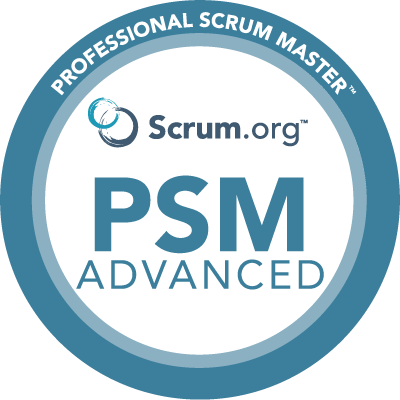Professional Scrum Master II (PSM II) Certification: A Deep Dive into Advanced Scrum Mastery

Introduction to the PSM II Certification
Overview
The Professional Scrum Master II (PSM II) certification from Scrum.org is designed for experienced Scrum Masters who wish to deepen their understanding of the Scrum framework and advance their skills in leading Agile transformations. Unlike the PSM I, which focuses on fundamental Scrum concepts, PSM II is for individuals who have real-world experience and want to enhance their ability to facilitate teams, resolve complex issues, and improve team performance. Launched by Ken Schwaber, co-creator of Scrum, PSM II has become one of the most respected certifications for advanced Scrum practitioners.

Key Facts
- Launched: 2010
- Global Reach: Over 50,000 professionals have earned the PSM II certification globally.
- Validity: The certification is valid for life and does not require renewal.
- Founder: Ken Schwaber, co-creator of the Scrum framework and founder of Scrum.org.
Target Audience
PSM II is aimed at experienced Scrum Masters, Agile coaches, and leaders who want to deepen their expertise in facilitating Scrum teams, managing organizational change, and ensuring effective Scrum implementation at scale. This certification is best suited for professionals who already hold PSM I and have at least 1-2 years of experience in the Scrum Master role.
Certification Objectives and Learning Outcomes
Core Learning Objectives
PSM II focuses on developing advanced skills in Agile leadership, conflict resolution, and organizational transformation. The main learning objectives include:
- Facilitating Scrum teams: Mastering the ability to lead high-performing Scrum teams and resolve complex challenges.
- Coaching the organization: Helping the broader organization embrace Scrum and improve its Agile maturity.
- Overcoming common pitfalls: Identifying and solving common team dysfunctions and improving team accountability and ownership.
- Advanced Scrum techniques: Applying empirical process control to complex environments, fostering continuous improvement across all levels.
Skills and Knowledge Gained
Upon achieving PSM II certification, individuals gain:
- A deeper understanding of Scrum theory and the ability to apply it to solve intricate team and organizational challenges.
- Expertise in facilitating collaboration, fostering team autonomy, and enhancing the delivery of value.
- Proficiency in navigating organizational impediments to Agile transformation, helping teams align with company goals and values.
- Advanced coaching and mentoring skills to guide teams through conflicts and growth phases.

Benefits to Professionals
- Career Advancement: The PSM II certification allows professionals to pursue senior roles such as Agile Coach, Senior Scrum Master, or Agile Delivery Lead.
- Increased Employability: Employers value PSM II-certified Scrum Masters due to their ability to lead complex, high-performing teams. Certified professionals often report a 20-30% increase in salary.
- Impact on Organizational Transformation: PSM II-certified professionals are better equipped to guide companies through Agile transformations, helping them adapt to changes and implement Scrum more effectively at scale.
Detailed Breakdown of the Certification Process

- Pre-requisites: While there are no formal prerequisites for the PSM II certification, it is recommended that candidates hold the PSM I certification and have at least 1-2 years of experience as a Scrum Master.
- Training Requirements: Although training is not required to take the PSM II exam, Scrum.org offers the Professional Scrum Master II (PSM II) course, a two-day workshop led by Professional Scrum Trainers (PSTs). This course covers advanced topics like coaching Agile teams, managing conflicts, and improving organizational Scrum maturity.
- Exam Format:
- Number of Questions: 30 multiple-choice, essay, and true/false questions
- Time Limit: 90 minutes
- Passing Score: 85%
- Retake Policy: Candidates can retake the exam by purchasing another attempt after reviewing feedback from their previous attempts.
- Certification Levels: Scrum.org offers three levels of Scrum Master certification:
- PSM I: Entry-level certification focused on Scrum fundamentals.
- PSM II: Advanced certification for experienced Scrum Masters.
- PSM III: Expert-level certification designed for Scrum Masters who can apply Scrum in complex, enterprise-level environments.
- Recertification: PSM II certification is valid for life and does not require renewal, offering long-term value without the need for ongoing recertification fees or processes.
Key Benefits of the Certification for Organizations
Impact on Teams and Organizations
Organizations that employ PSM II-certified Scrum Masters often experience improved team dynamics, increased delivery efficiency, and better collaboration across departments. These professionals are trained to help teams reach higher levels of performance, self-organization, and accountability, all while maintaining alignment with organizational goals.
Real-World Application
At companies like Google and Spotify, PSM II-certified Scrum Masters have been pivotal in facilitating Agile transformations. These professionals have implemented advanced Scrum techniques to reduce project bottlenecks, improve cross-functional collaboration, and increase time-to-market for key product releases.
Industry Recognition
The PSM II certification is recognized by leading global organizations, including BMW, IBM, and Deloitte, for its rigor and real-world applicability. Employers value PSM II-certified professionals for their ability to navigate complex organizational environments and lead large-scale Scrum implementations.

Case Studies
At ING, PSM II-certified Scrum Masters helped the organization scale its Agile practices across 12 different teams, resulting in a 20% improvement in productivity and better stakeholder engagement. Similarly, at Siemens, PSM II-certified professionals guided Agile transformations that shortened project delivery times by 30%.
Certification Costs and Value Proposition

Cost of Certification
The PSM II exam costs $250, and while formal training is not required, the Professional Scrum Master II (PSM II) course costs between $1,200 and $2,000, depending on the region and provider. This course is highly recommended for professionals seeking to solidify their advanced Scrum skills before taking the exam.
Return on Investment (ROI)
Professionals who obtain the PSM II certification often see a significant return on investment. In terms of salary, PSM II-certified professionals earn 20-30% more than their non-certified peers, especially in industries like IT, software development, and digital marketing, where Agile practices are prevalent. Additionally, certified professionals report greater job satisfaction and career mobility.
Financial Aid and Discounts
While Scrum.org does not offer direct financial aid, many training providers offer group discounts for organizations training multiple employees. Additionally, some employers sponsor their employees’ certification as part of their Agile transformation initiatives.
Comparison with Other Certifications
Competitor Analysis
The PSM II certification is often compared to certifications like the Advanced Certified ScrumMaster (A-CSM) from Scrum Alliance and SAFe® Advanced Scrum Master (SASM) from Scaled Agile. While the CSM certification focuses more on introductory Scrum concepts, PSM II delves into advanced Scrum mastery, coaching, and team facilitation, offering a more rigorous and in-depth examination of Scrum practices.
Unique Features
One of the key advantages of the PSM II certification is its framework-agnostic approach, which means that it equips professionals with skills that can be applied across a variety of industries and Scrum implementations. Unlike some certifications that require renewal every few years, PSM II is valid for life, making it a cost-effective long-term investment.
Industry Trends
As companies adopt remote work and implement Agile at scale, certifications like PSM II become increasingly important. The certification provides Scrum Masters with the skills needed to lead distributed teams, navigate organizational complexity, and implement DevOps and other modern Agile practices.

Success Stories and Testimonials

Case Studies
At Microsoft, PSM II-certified Scrum Masters led successful Agile transformations, reducing time-to-market by 20% and increasing team morale and productivity. Similarly, at Bosch, PSM II-certified professionals implemented advanced Scrum techniques to scale Agile practices across multiple product lines, resulting in a 15% improvement in efficiency.
Personal Success
James Carter, a PSM II-certified Scrum Master at Amazon, said, “The PSM II certification gave me the tools and knowledge to lead multiple Scrum teams effectively and help my organization achieve greater business agility.”
Notable Companies
Organizations such as Intel, SAP, and Philips prioritize hiring PSM II-certified Scrum Masters to lead their Agile initiatives and support the scaling of Scrum across departments, further validating the value and recognition of this certification.
The Future of Agile and This Certification
Emerging Trends
With Agile practices becoming more mainstream, companies are looking for professionals who can scale Agile frameworks and manage remote, distributed teams. The PSM II certification helps prepare Scrum Masters for the complexities of Agile at scale, enabling them to lead teams in global, digitally-driven environments. As more organizations implement AI-powered project management tools, certified Scrum Masters will be expected to integrate these technologies into their Scrum practices.
Future Updates to the Certification
Scrum.org regularly updates its certification exams to reflect the latestScrum.org regularly updates its certification exams to reflect the latest trends in Agile practices and Scrum mastery. Future updates to the PSM II certification may include more emphasis on managing remote and hybrid teams, integrating AI-powered tools for Agile project management, and refining value-stream mapping techniques to align product delivery with business goals.

Relevance in a Changing Market
As Agile continues to evolve across industries, the PSM II certification remains essential for professionals who want to stay ahead in their careers. With organizations increasingly adopting Agile at scale, implementing DevOps practices, and working within distributed teams, certified Scrum Masters with advanced knowledge and leadership skills are in high demand. PSM II ensures that professionals are equipped to tackle complex challenges, improve team dynamics, and lead organizations through their Agile transformation journeys.
Conclusion
The Professional Scrum Master II (PSM II) certification is an invaluable credential for experienced Scrum Masters and Agile leaders who are looking to deepen their knowledge, drive team success, and lead organizational change. Whether you’re aiming to advance your career or make a significant impact on your organization, earning your PSM II will provide you with the tools, techniques, and confidence to excel in Agile environments.